Enhancing Global Management: Cross-Cultural Communication Techniques
VerifiedAdded on 2023/05/28
|14
|3520
|147
Essay
AI Summary
This essay discusses the importance of cross-cultural communication in global firms, particularly in the context of multinational organizations operating in Australia. It emphasizes that effective intercultural communication skills are crucial for successful management, teamwork, and leadership. The essay explores how cultural differences can impact communication, potentially leading to barriers and conflicts. It reviews literature on how cross-cultural communication influences leadership, workplace environment, ethical behavior, and employee performance. The analysis includes a research example demonstrating the positive impact of implementing cross-cultural communication techniques on customer service and overall management efficiency, highlighting the need for training and awareness in diverse cultural practices to foster a conducive and productive work environment.
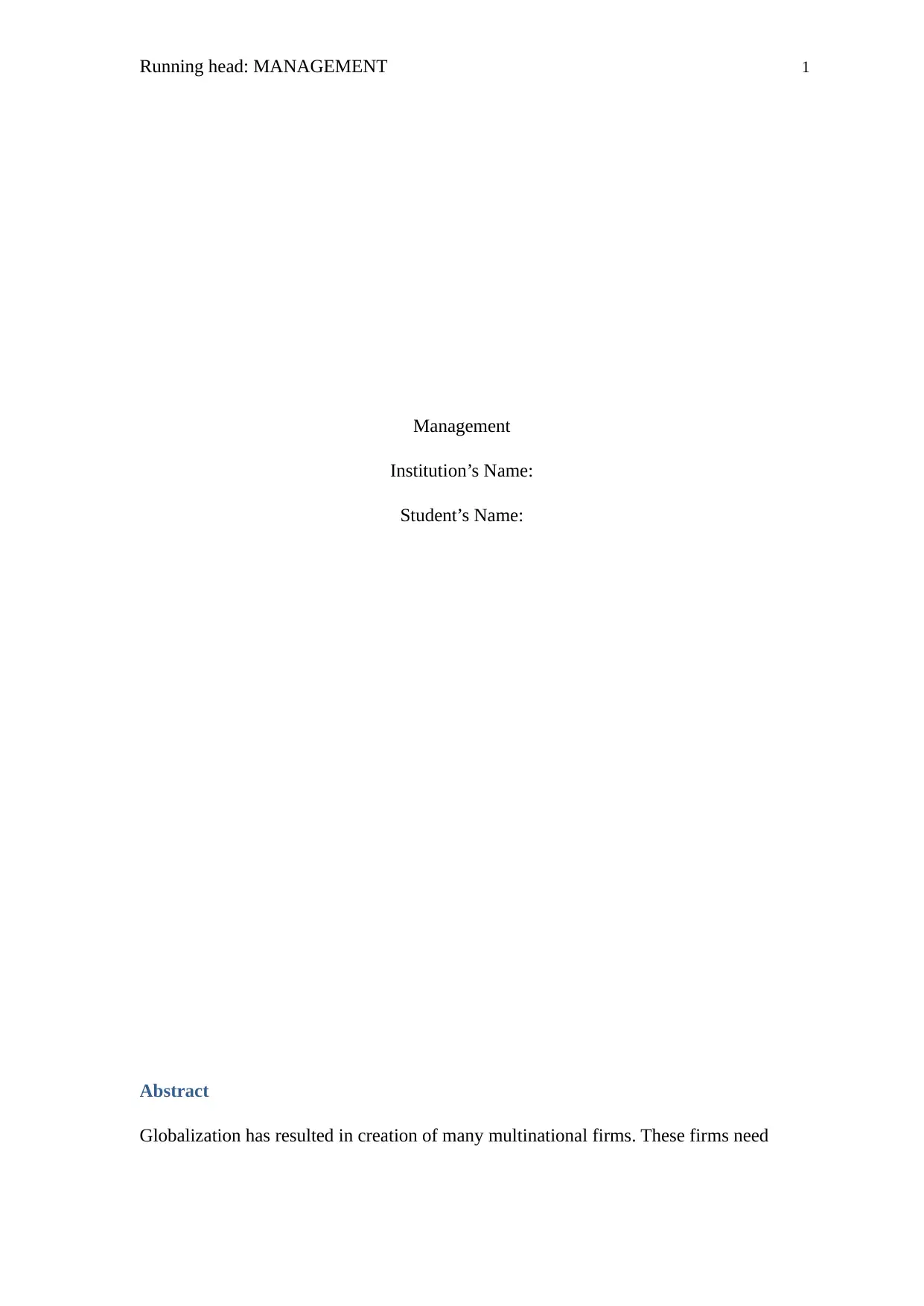
Running head: MANAGEMENT 1
Management
Institution’s Name:
Student’s Name:
Abstract
Globalization has resulted in creation of many multinational firms. These firms need
Management
Institution’s Name:
Student’s Name:
Abstract
Globalization has resulted in creation of many multinational firms. These firms need
Paraphrase This Document
Need a fresh take? Get an instant paraphrase of this document with our AI Paraphraser
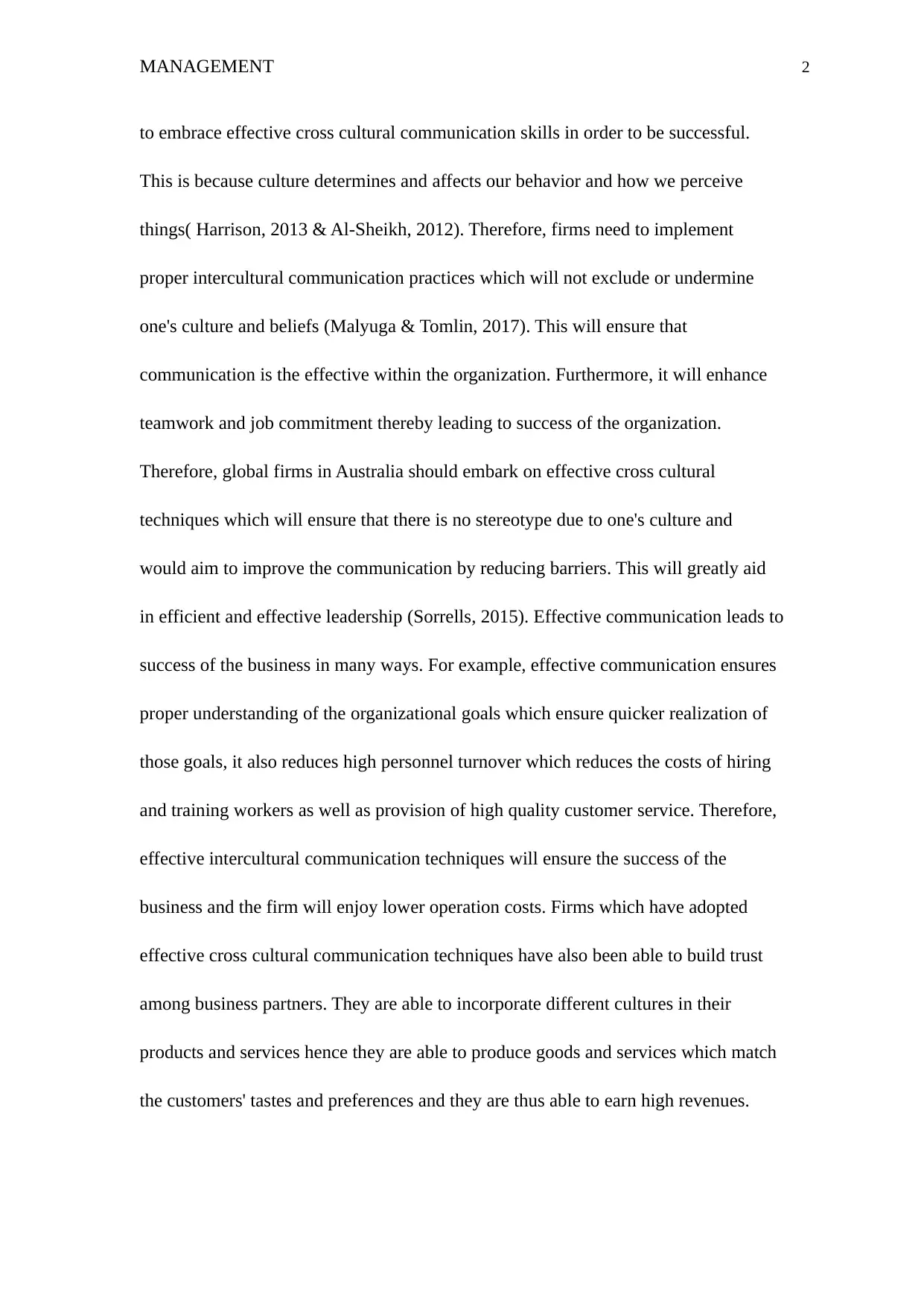
MANAGEMENT 2
to embrace effective cross cultural communication skills in order to be successful.
This is because culture determines and affects our behavior and how we perceive
things( Harrison, 2013 & Al-Sheikh, 2012). Therefore, firms need to implement
proper intercultural communication practices which will not exclude or undermine
one's culture and beliefs (Malyuga & Tomlin, 2017). This will ensure that
communication is the effective within the organization. Furthermore, it will enhance
teamwork and job commitment thereby leading to success of the organization.
Therefore, global firms in Australia should embark on effective cross cultural
techniques which will ensure that there is no stereotype due to one's culture and
would aim to improve the communication by reducing barriers. This will greatly aid
in efficient and effective leadership (Sorrells, 2015). Effective communication leads to
success of the business in many ways. For example, effective communication ensures
proper understanding of the organizational goals which ensure quicker realization of
those goals, it also reduces high personnel turnover which reduces the costs of hiring
and training workers as well as provision of high quality customer service. Therefore,
effective intercultural communication techniques will ensure the success of the
business and the firm will enjoy lower operation costs. Firms which have adopted
effective cross cultural communication techniques have also been able to build trust
among business partners. They are able to incorporate different cultures in their
products and services hence they are able to produce goods and services which match
the customers' tastes and preferences and they are thus able to earn high revenues.
to embrace effective cross cultural communication skills in order to be successful.
This is because culture determines and affects our behavior and how we perceive
things( Harrison, 2013 & Al-Sheikh, 2012). Therefore, firms need to implement
proper intercultural communication practices which will not exclude or undermine
one's culture and beliefs (Malyuga & Tomlin, 2017). This will ensure that
communication is the effective within the organization. Furthermore, it will enhance
teamwork and job commitment thereby leading to success of the organization.
Therefore, global firms in Australia should embark on effective cross cultural
techniques which will ensure that there is no stereotype due to one's culture and
would aim to improve the communication by reducing barriers. This will greatly aid
in efficient and effective leadership (Sorrells, 2015). Effective communication leads to
success of the business in many ways. For example, effective communication ensures
proper understanding of the organizational goals which ensure quicker realization of
those goals, it also reduces high personnel turnover which reduces the costs of hiring
and training workers as well as provision of high quality customer service. Therefore,
effective intercultural communication techniques will ensure the success of the
business and the firm will enjoy lower operation costs. Firms which have adopted
effective cross cultural communication techniques have also been able to build trust
among business partners. They are able to incorporate different cultures in their
products and services hence they are able to produce goods and services which match
the customers' tastes and preferences and they are thus able to earn high revenues.
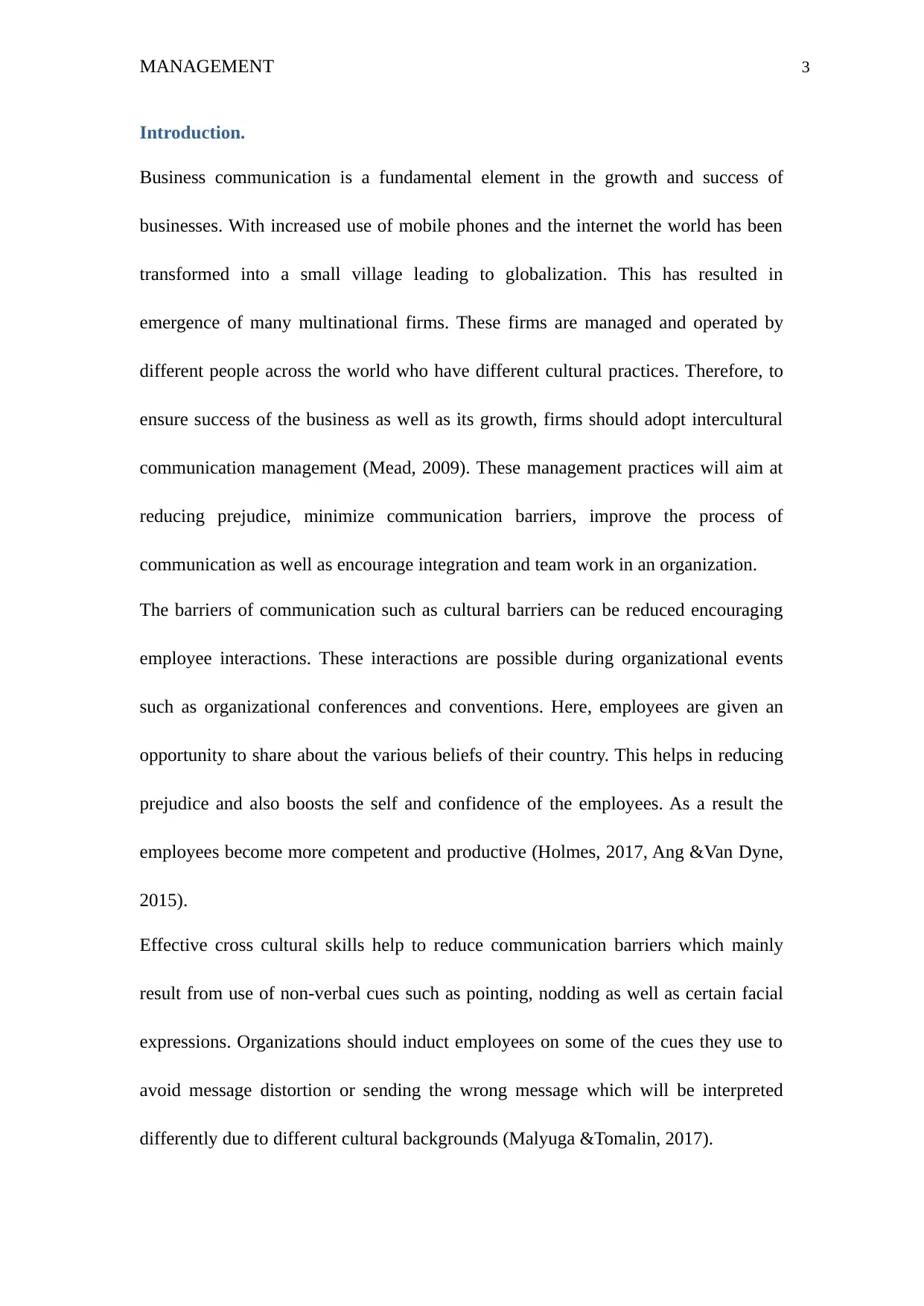
MANAGEMENT 3
Introduction.
Business communication is a fundamental element in the growth and success of
businesses. With increased use of mobile phones and the internet the world has been
transformed into a small village leading to globalization. This has resulted in
emergence of many multinational firms. These firms are managed and operated by
different people across the world who have different cultural practices. Therefore, to
ensure success of the business as well as its growth, firms should adopt intercultural
communication management (Mead, 2009). These management practices will aim at
reducing prejudice, minimize communication barriers, improve the process of
communication as well as encourage integration and team work in an organization.
The barriers of communication such as cultural barriers can be reduced encouraging
employee interactions. These interactions are possible during organizational events
such as organizational conferences and conventions. Here, employees are given an
opportunity to share about the various beliefs of their country. This helps in reducing
prejudice and also boosts the self and confidence of the employees. As a result the
employees become more competent and productive (Holmes, 2017, Ang &Van Dyne,
2015).
Effective cross cultural skills help to reduce communication barriers which mainly
result from use of non-verbal cues such as pointing, nodding as well as certain facial
expressions. Organizations should induct employees on some of the cues they use to
avoid message distortion or sending the wrong message which will be interpreted
differently due to different cultural backgrounds (Malyuga &Tomalin, 2017).
Introduction.
Business communication is a fundamental element in the growth and success of
businesses. With increased use of mobile phones and the internet the world has been
transformed into a small village leading to globalization. This has resulted in
emergence of many multinational firms. These firms are managed and operated by
different people across the world who have different cultural practices. Therefore, to
ensure success of the business as well as its growth, firms should adopt intercultural
communication management (Mead, 2009). These management practices will aim at
reducing prejudice, minimize communication barriers, improve the process of
communication as well as encourage integration and team work in an organization.
The barriers of communication such as cultural barriers can be reduced encouraging
employee interactions. These interactions are possible during organizational events
such as organizational conferences and conventions. Here, employees are given an
opportunity to share about the various beliefs of their country. This helps in reducing
prejudice and also boosts the self and confidence of the employees. As a result the
employees become more competent and productive (Holmes, 2017, Ang &Van Dyne,
2015).
Effective cross cultural skills help to reduce communication barriers which mainly
result from use of non-verbal cues such as pointing, nodding as well as certain facial
expressions. Organizations should induct employees on some of the cues they use to
avoid message distortion or sending the wrong message which will be interpreted
differently due to different cultural backgrounds (Malyuga &Tomalin, 2017).
⊘ This is a preview!⊘
Do you want full access?
Subscribe today to unlock all pages.

Trusted by 1+ million students worldwide
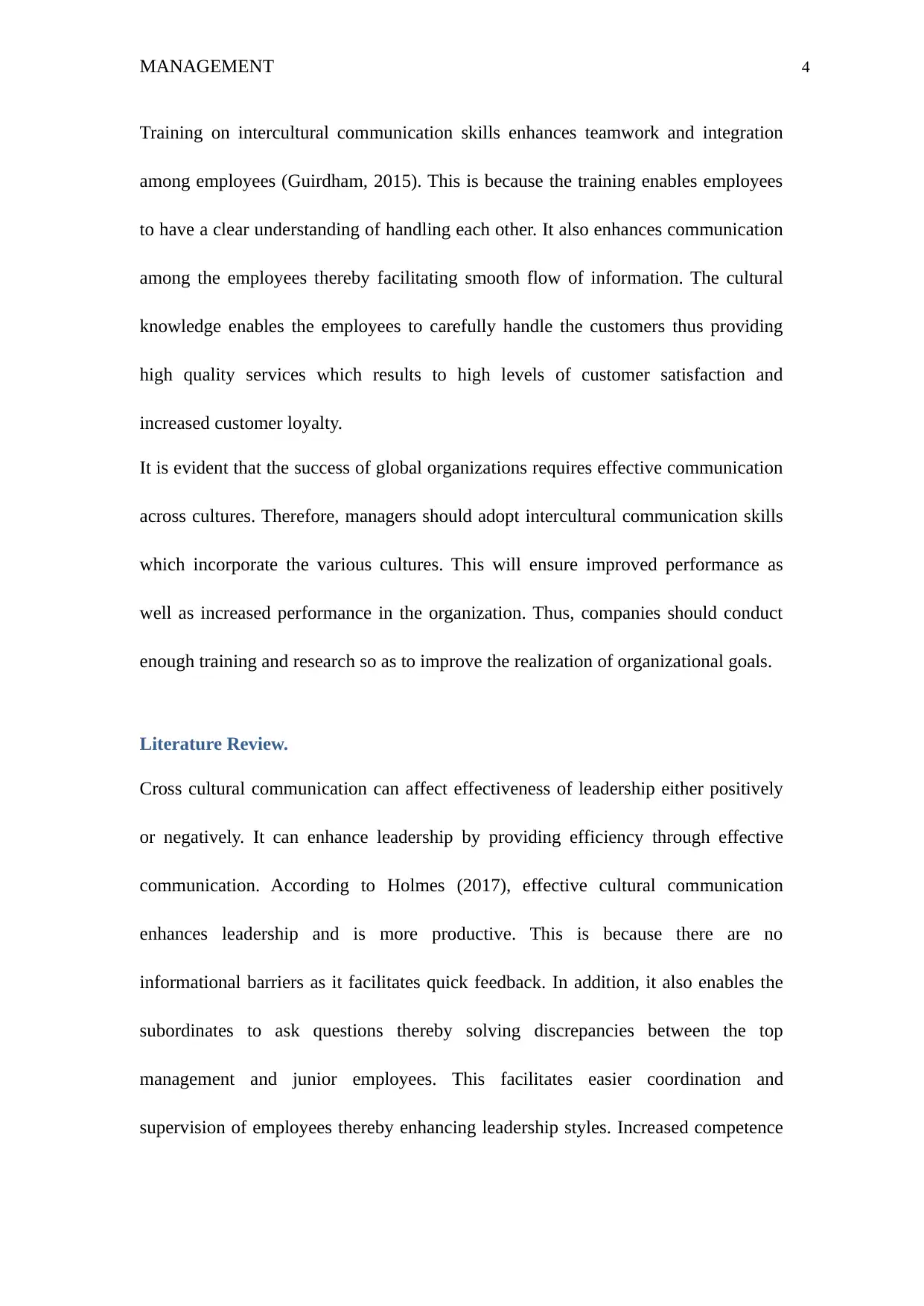
MANAGEMENT 4
Training on intercultural communication skills enhances teamwork and integration
among employees (Guirdham, 2015). This is because the training enables employees
to have a clear understanding of handling each other. It also enhances communication
among the employees thereby facilitating smooth flow of information. The cultural
knowledge enables the employees to carefully handle the customers thus providing
high quality services which results to high levels of customer satisfaction and
increased customer loyalty.
It is evident that the success of global organizations requires effective communication
across cultures. Therefore, managers should adopt intercultural communication skills
which incorporate the various cultures. This will ensure improved performance as
well as increased performance in the organization. Thus, companies should conduct
enough training and research so as to improve the realization of organizational goals.
Literature Review.
Cross cultural communication can affect effectiveness of leadership either positively
or negatively. It can enhance leadership by providing efficiency through effective
communication. According to Holmes (2017), effective cultural communication
enhances leadership and is more productive. This is because there are no
informational barriers as it facilitates quick feedback. In addition, it also enables the
subordinates to ask questions thereby solving discrepancies between the top
management and junior employees. This facilitates easier coordination and
supervision of employees thereby enhancing leadership styles. Increased competence
Training on intercultural communication skills enhances teamwork and integration
among employees (Guirdham, 2015). This is because the training enables employees
to have a clear understanding of handling each other. It also enhances communication
among the employees thereby facilitating smooth flow of information. The cultural
knowledge enables the employees to carefully handle the customers thus providing
high quality services which results to high levels of customer satisfaction and
increased customer loyalty.
It is evident that the success of global organizations requires effective communication
across cultures. Therefore, managers should adopt intercultural communication skills
which incorporate the various cultures. This will ensure improved performance as
well as increased performance in the organization. Thus, companies should conduct
enough training and research so as to improve the realization of organizational goals.
Literature Review.
Cross cultural communication can affect effectiveness of leadership either positively
or negatively. It can enhance leadership by providing efficiency through effective
communication. According to Holmes (2017), effective cultural communication
enhances leadership and is more productive. This is because there are no
informational barriers as it facilitates quick feedback. In addition, it also enables the
subordinates to ask questions thereby solving discrepancies between the top
management and junior employees. This facilitates easier coordination and
supervision of employees thereby enhancing leadership styles. Increased competence
Paraphrase This Document
Need a fresh take? Get an instant paraphrase of this document with our AI Paraphraser
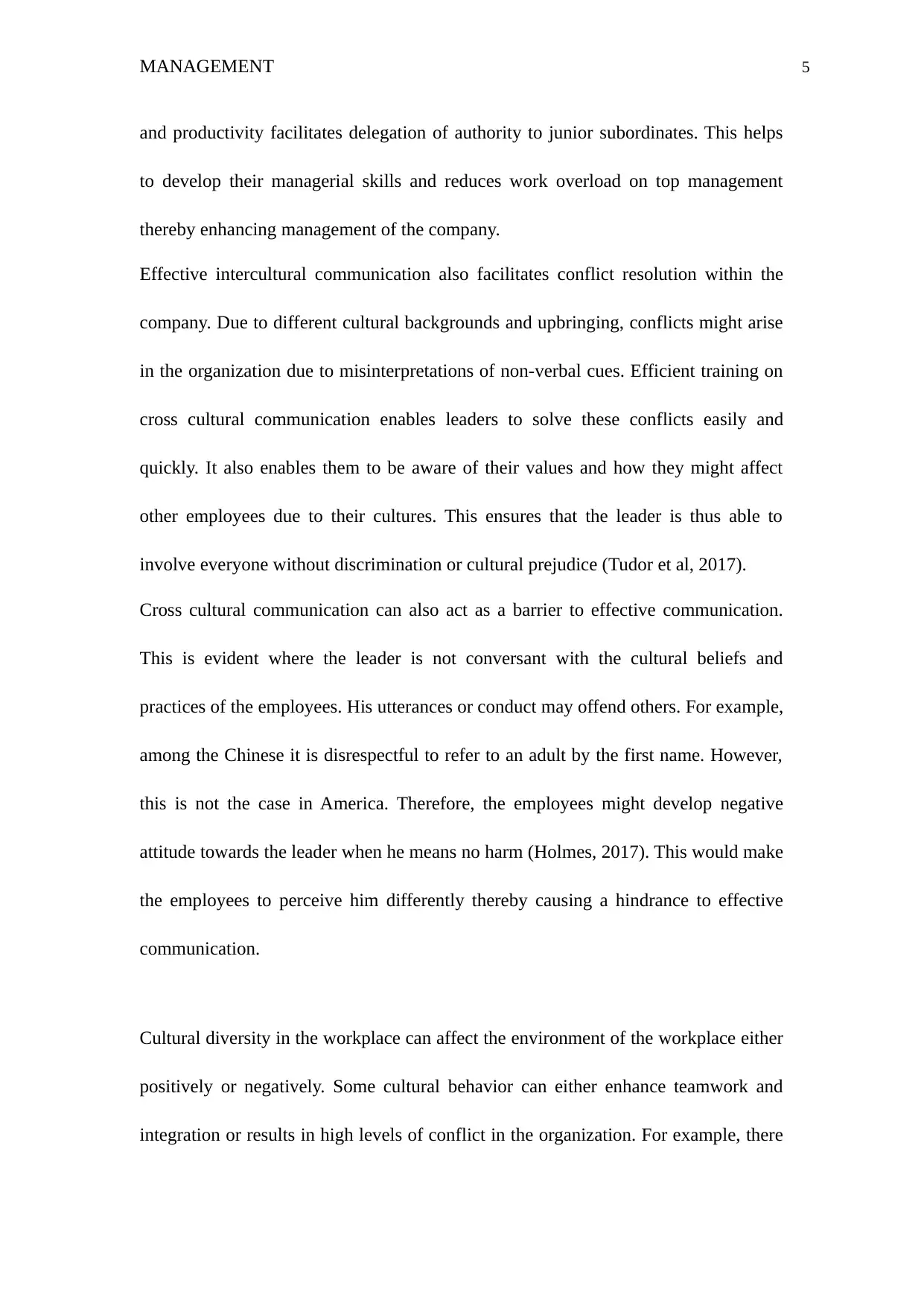
MANAGEMENT 5
and productivity facilitates delegation of authority to junior subordinates. This helps
to develop their managerial skills and reduces work overload on top management
thereby enhancing management of the company.
Effective intercultural communication also facilitates conflict resolution within the
company. Due to different cultural backgrounds and upbringing, conflicts might arise
in the organization due to misinterpretations of non-verbal cues. Efficient training on
cross cultural communication enables leaders to solve these conflicts easily and
quickly. It also enables them to be aware of their values and how they might affect
other employees due to their cultures. This ensures that the leader is thus able to
involve everyone without discrimination or cultural prejudice (Tudor et al, 2017).
Cross cultural communication can also act as a barrier to effective communication.
This is evident where the leader is not conversant with the cultural beliefs and
practices of the employees. His utterances or conduct may offend others. For example,
among the Chinese it is disrespectful to refer to an adult by the first name. However,
this is not the case in America. Therefore, the employees might develop negative
attitude towards the leader when he means no harm (Holmes, 2017). This would make
the employees to perceive him differently thereby causing a hindrance to effective
communication.
Cultural diversity in the workplace can affect the environment of the workplace either
positively or negatively. Some cultural behavior can either enhance teamwork and
integration or results in high levels of conflict in the organization. For example, there
and productivity facilitates delegation of authority to junior subordinates. This helps
to develop their managerial skills and reduces work overload on top management
thereby enhancing management of the company.
Effective intercultural communication also facilitates conflict resolution within the
company. Due to different cultural backgrounds and upbringing, conflicts might arise
in the organization due to misinterpretations of non-verbal cues. Efficient training on
cross cultural communication enables leaders to solve these conflicts easily and
quickly. It also enables them to be aware of their values and how they might affect
other employees due to their cultures. This ensures that the leader is thus able to
involve everyone without discrimination or cultural prejudice (Tudor et al, 2017).
Cross cultural communication can also act as a barrier to effective communication.
This is evident where the leader is not conversant with the cultural beliefs and
practices of the employees. His utterances or conduct may offend others. For example,
among the Chinese it is disrespectful to refer to an adult by the first name. However,
this is not the case in America. Therefore, the employees might develop negative
attitude towards the leader when he means no harm (Holmes, 2017). This would make
the employees to perceive him differently thereby causing a hindrance to effective
communication.
Cultural diversity in the workplace can affect the environment of the workplace either
positively or negatively. Some cultural behavior can either enhance teamwork and
integration or results in high levels of conflict in the organization. For example, there
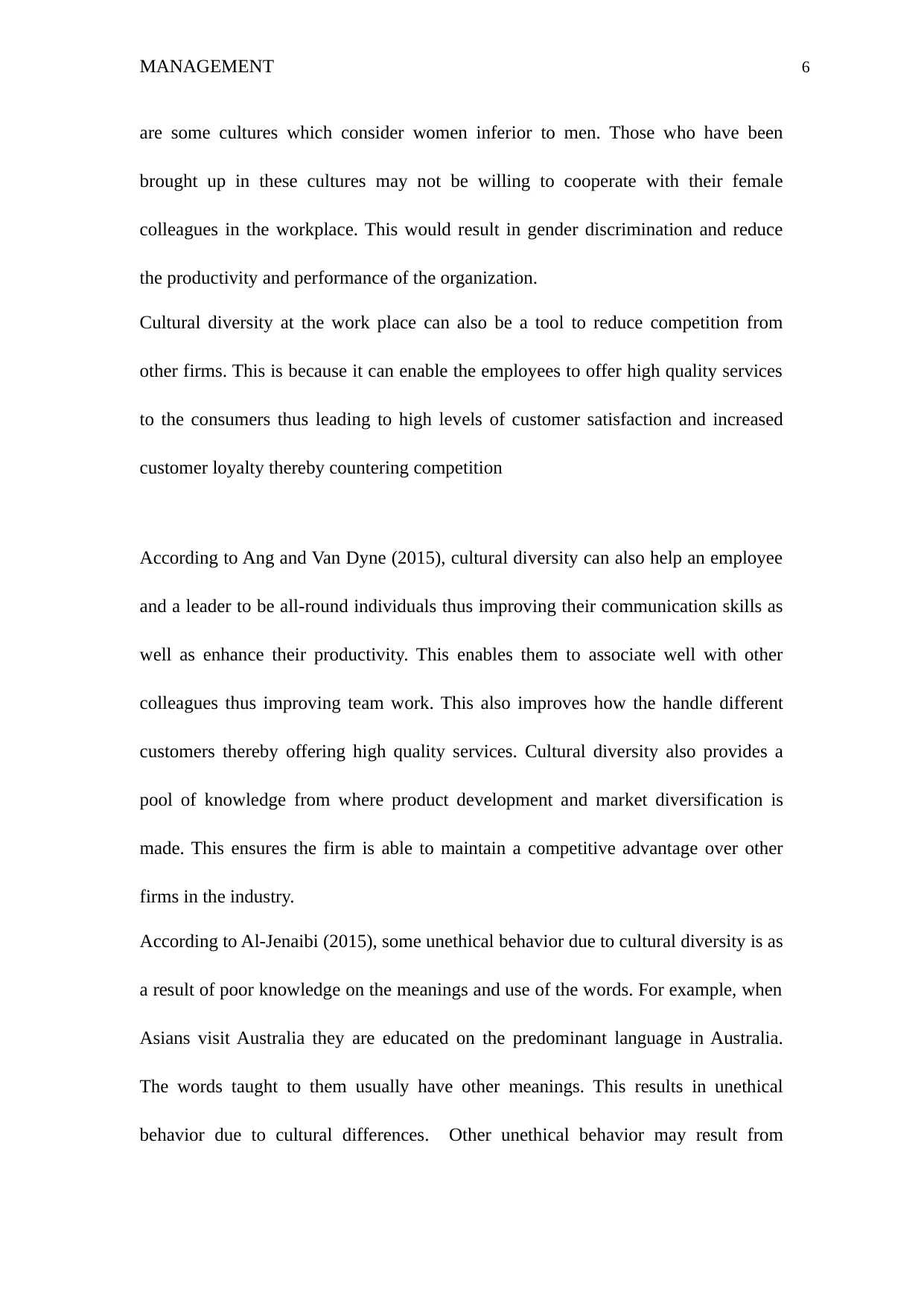
MANAGEMENT 6
are some cultures which consider women inferior to men. Those who have been
brought up in these cultures may not be willing to cooperate with their female
colleagues in the workplace. This would result in gender discrimination and reduce
the productivity and performance of the organization.
Cultural diversity at the work place can also be a tool to reduce competition from
other firms. This is because it can enable the employees to offer high quality services
to the consumers thus leading to high levels of customer satisfaction and increased
customer loyalty thereby countering competition
According to Ang and Van Dyne (2015), cultural diversity can also help an employee
and a leader to be all-round individuals thus improving their communication skills as
well as enhance their productivity. This enables them to associate well with other
colleagues thus improving team work. This also improves how the handle different
customers thereby offering high quality services. Cultural diversity also provides a
pool of knowledge from where product development and market diversification is
made. This ensures the firm is able to maintain a competitive advantage over other
firms in the industry.
According to Al-Jenaibi (2015), some unethical behavior due to cultural diversity is as
a result of poor knowledge on the meanings and use of the words. For example, when
Asians visit Australia they are educated on the predominant language in Australia.
The words taught to them usually have other meanings. This results in unethical
behavior due to cultural differences. Other unethical behavior may result from
are some cultures which consider women inferior to men. Those who have been
brought up in these cultures may not be willing to cooperate with their female
colleagues in the workplace. This would result in gender discrimination and reduce
the productivity and performance of the organization.
Cultural diversity at the work place can also be a tool to reduce competition from
other firms. This is because it can enable the employees to offer high quality services
to the consumers thus leading to high levels of customer satisfaction and increased
customer loyalty thereby countering competition
According to Ang and Van Dyne (2015), cultural diversity can also help an employee
and a leader to be all-round individuals thus improving their communication skills as
well as enhance their productivity. This enables them to associate well with other
colleagues thus improving team work. This also improves how the handle different
customers thereby offering high quality services. Cultural diversity also provides a
pool of knowledge from where product development and market diversification is
made. This ensures the firm is able to maintain a competitive advantage over other
firms in the industry.
According to Al-Jenaibi (2015), some unethical behavior due to cultural diversity is as
a result of poor knowledge on the meanings and use of the words. For example, when
Asians visit Australia they are educated on the predominant language in Australia.
The words taught to them usually have other meanings. This results in unethical
behavior due to cultural differences. Other unethical behavior may result from
⊘ This is a preview!⊘
Do you want full access?
Subscribe today to unlock all pages.

Trusted by 1+ million students worldwide
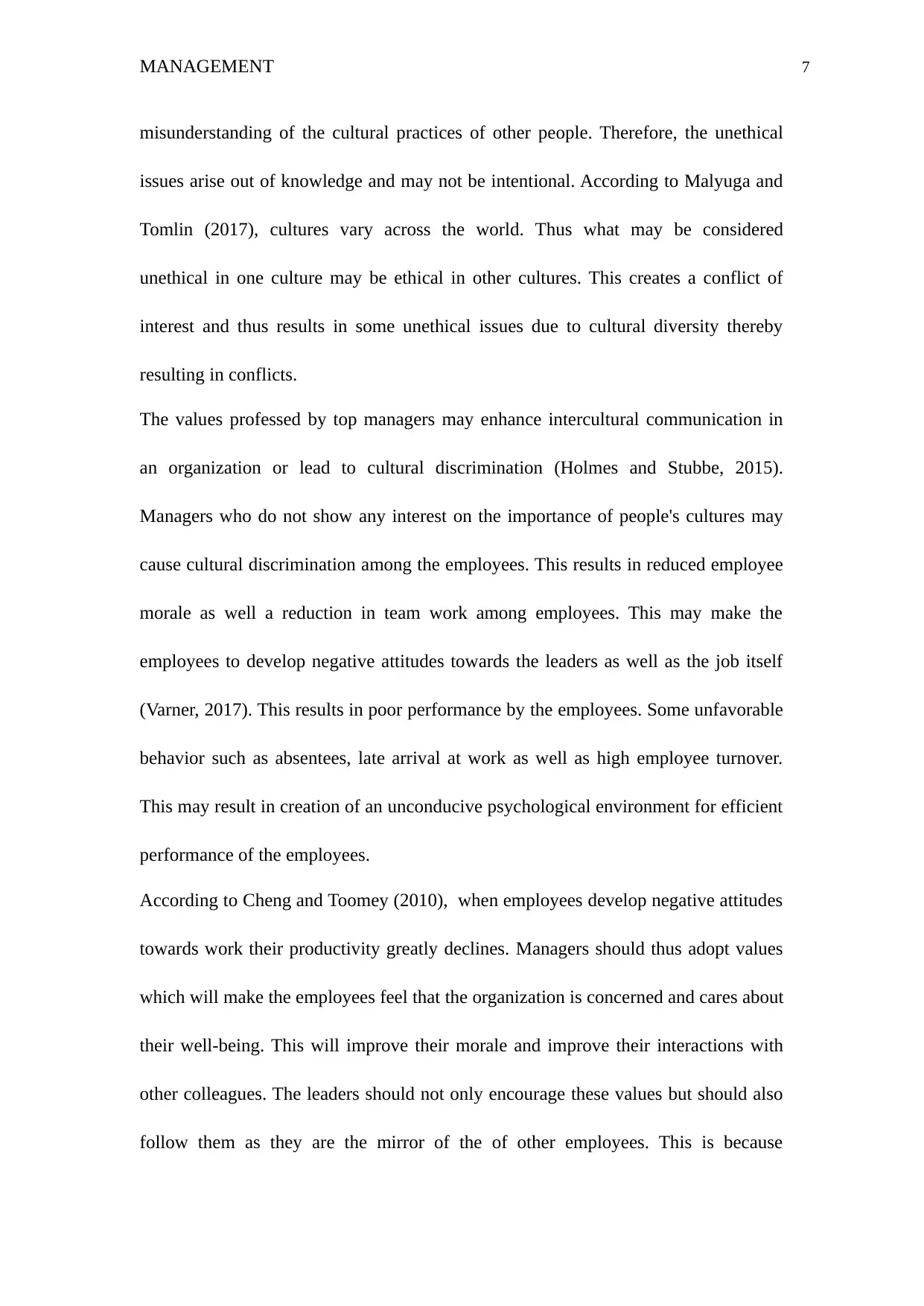
MANAGEMENT 7
misunderstanding of the cultural practices of other people. Therefore, the unethical
issues arise out of knowledge and may not be intentional. According to Malyuga and
Tomlin (2017), cultures vary across the world. Thus what may be considered
unethical in one culture may be ethical in other cultures. This creates a conflict of
interest and thus results in some unethical issues due to cultural diversity thereby
resulting in conflicts.
The values professed by top managers may enhance intercultural communication in
an organization or lead to cultural discrimination (Holmes and Stubbe, 2015).
Managers who do not show any interest on the importance of people's cultures may
cause cultural discrimination among the employees. This results in reduced employee
morale as well a reduction in team work among employees. This may make the
employees to develop negative attitudes towards the leaders as well as the job itself
(Varner, 2017). This results in poor performance by the employees. Some unfavorable
behavior such as absentees, late arrival at work as well as high employee turnover.
This may result in creation of an unconducive psychological environment for efficient
performance of the employees.
According to Cheng and Toomey (2010), when employees develop negative attitudes
towards work their productivity greatly declines. Managers should thus adopt values
which will make the employees feel that the organization is concerned and cares about
their well-being. This will improve their morale and improve their interactions with
other colleagues. The leaders should not only encourage these values but should also
follow them as they are the mirror of the of other employees. This is because
misunderstanding of the cultural practices of other people. Therefore, the unethical
issues arise out of knowledge and may not be intentional. According to Malyuga and
Tomlin (2017), cultures vary across the world. Thus what may be considered
unethical in one culture may be ethical in other cultures. This creates a conflict of
interest and thus results in some unethical issues due to cultural diversity thereby
resulting in conflicts.
The values professed by top managers may enhance intercultural communication in
an organization or lead to cultural discrimination (Holmes and Stubbe, 2015).
Managers who do not show any interest on the importance of people's cultures may
cause cultural discrimination among the employees. This results in reduced employee
morale as well a reduction in team work among employees. This may make the
employees to develop negative attitudes towards the leaders as well as the job itself
(Varner, 2017). This results in poor performance by the employees. Some unfavorable
behavior such as absentees, late arrival at work as well as high employee turnover.
This may result in creation of an unconducive psychological environment for efficient
performance of the employees.
According to Cheng and Toomey (2010), when employees develop negative attitudes
towards work their productivity greatly declines. Managers should thus adopt values
which will make the employees feel that the organization is concerned and cares about
their well-being. This will improve their morale and improve their interactions with
other colleagues. The leaders should not only encourage these values but should also
follow them as they are the mirror of the of other employees. This is because
Paraphrase This Document
Need a fresh take? Get an instant paraphrase of this document with our AI Paraphraser
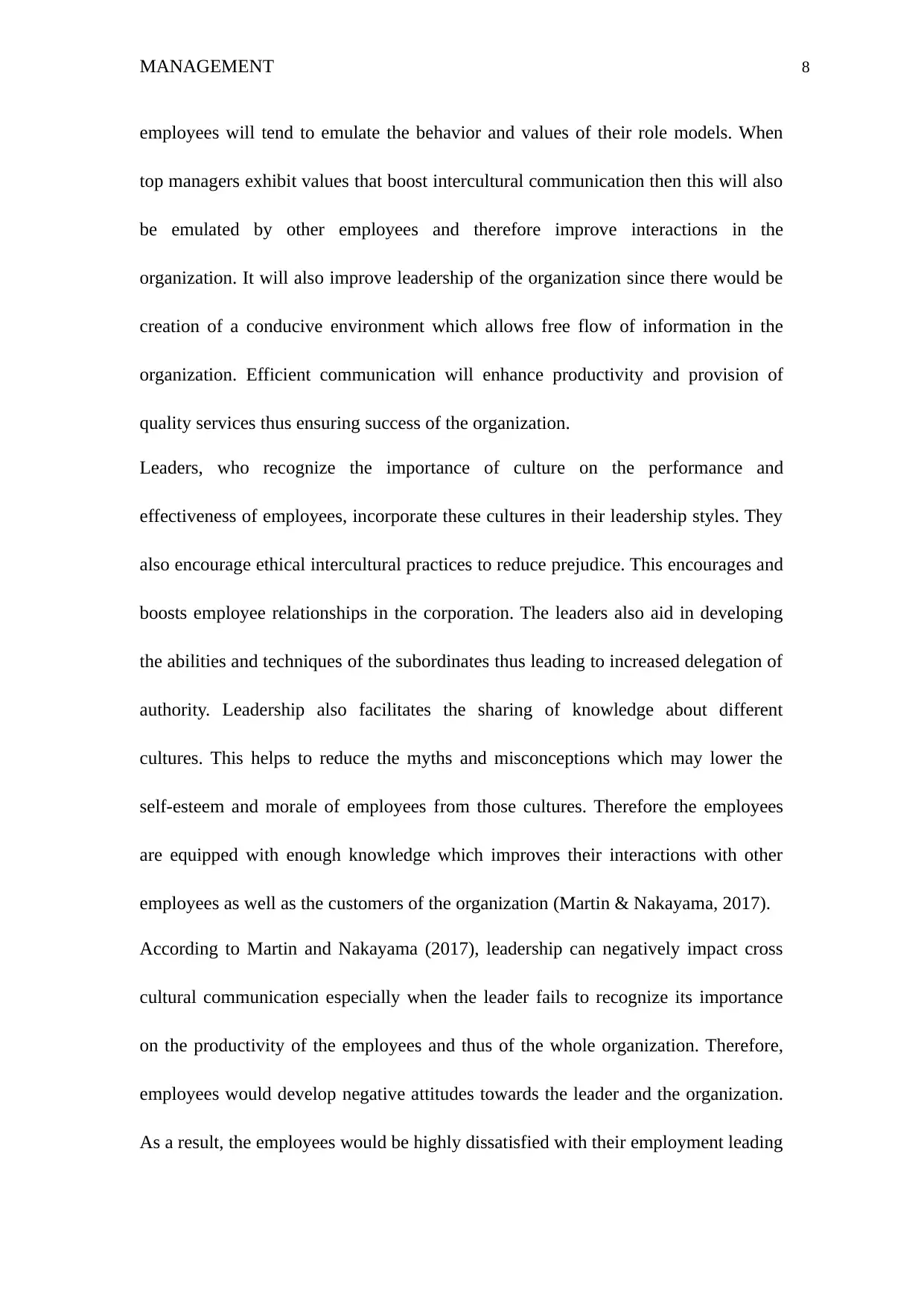
MANAGEMENT 8
employees will tend to emulate the behavior and values of their role models. When
top managers exhibit values that boost intercultural communication then this will also
be emulated by other employees and therefore improve interactions in the
organization. It will also improve leadership of the organization since there would be
creation of a conducive environment which allows free flow of information in the
organization. Efficient communication will enhance productivity and provision of
quality services thus ensuring success of the organization.
Leaders, who recognize the importance of culture on the performance and
effectiveness of employees, incorporate these cultures in their leadership styles. They
also encourage ethical intercultural practices to reduce prejudice. This encourages and
boosts employee relationships in the corporation. The leaders also aid in developing
the abilities and techniques of the subordinates thus leading to increased delegation of
authority. Leadership also facilitates the sharing of knowledge about different
cultures. This helps to reduce the myths and misconceptions which may lower the
self-esteem and morale of employees from those cultures. Therefore the employees
are equipped with enough knowledge which improves their interactions with other
employees as well as the customers of the organization (Martin & Nakayama, 2017).
According to Martin and Nakayama (2017), leadership can negatively impact cross
cultural communication especially when the leader fails to recognize its importance
on the productivity of the employees and thus of the whole organization. Therefore,
employees would develop negative attitudes towards the leader and the organization.
As a result, the employees would be highly dissatisfied with their employment leading
employees will tend to emulate the behavior and values of their role models. When
top managers exhibit values that boost intercultural communication then this will also
be emulated by other employees and therefore improve interactions in the
organization. It will also improve leadership of the organization since there would be
creation of a conducive environment which allows free flow of information in the
organization. Efficient communication will enhance productivity and provision of
quality services thus ensuring success of the organization.
Leaders, who recognize the importance of culture on the performance and
effectiveness of employees, incorporate these cultures in their leadership styles. They
also encourage ethical intercultural practices to reduce prejudice. This encourages and
boosts employee relationships in the corporation. The leaders also aid in developing
the abilities and techniques of the subordinates thus leading to increased delegation of
authority. Leadership also facilitates the sharing of knowledge about different
cultures. This helps to reduce the myths and misconceptions which may lower the
self-esteem and morale of employees from those cultures. Therefore the employees
are equipped with enough knowledge which improves their interactions with other
employees as well as the customers of the organization (Martin & Nakayama, 2017).
According to Martin and Nakayama (2017), leadership can negatively impact cross
cultural communication especially when the leader fails to recognize its importance
on the productivity of the employees and thus of the whole organization. Therefore,
employees would develop negative attitudes towards the leader and the organization.
As a result, the employees would be highly dissatisfied with their employment leading
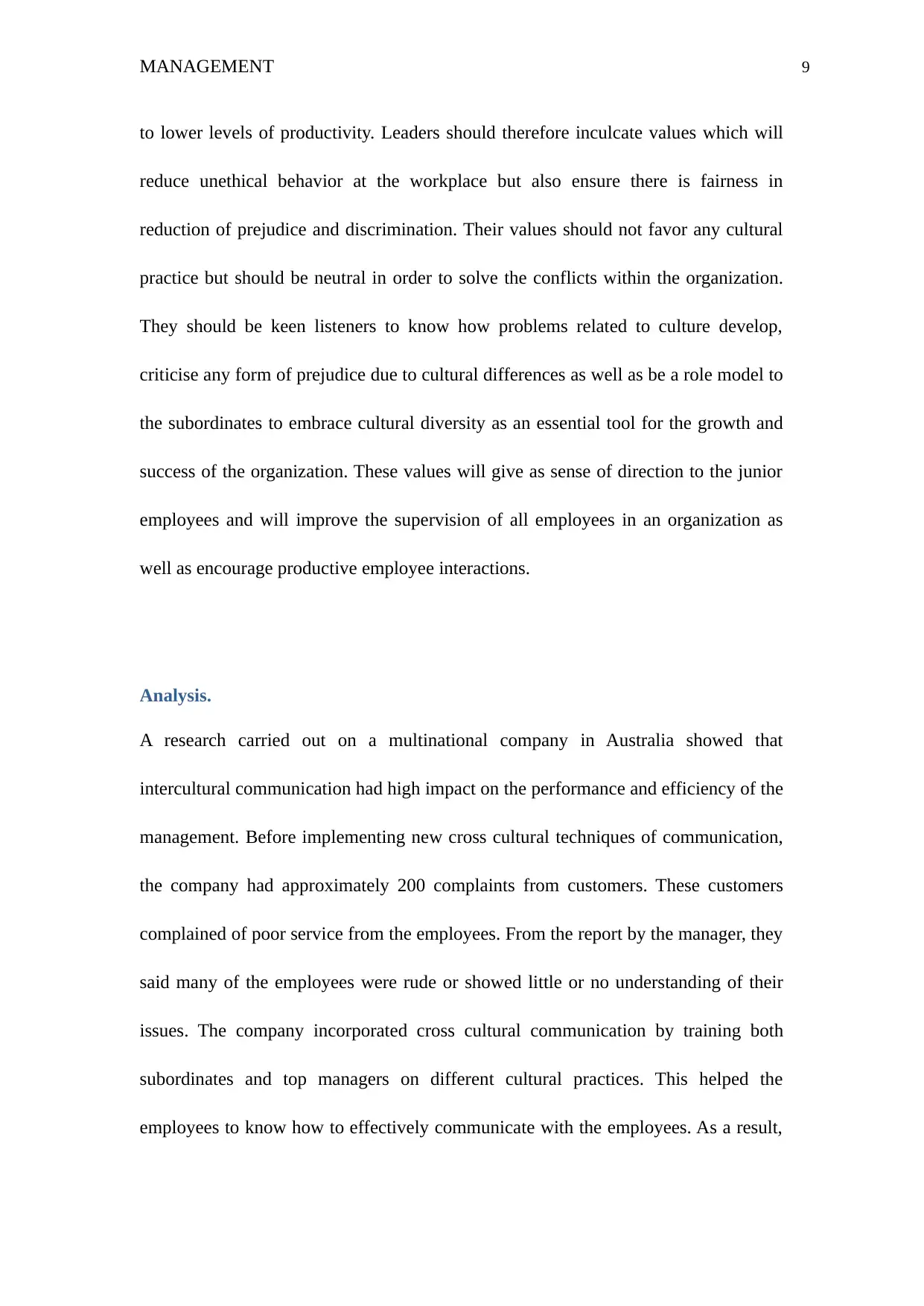
MANAGEMENT 9
to lower levels of productivity. Leaders should therefore inculcate values which will
reduce unethical behavior at the workplace but also ensure there is fairness in
reduction of prejudice and discrimination. Their values should not favor any cultural
practice but should be neutral in order to solve the conflicts within the organization.
They should be keen listeners to know how problems related to culture develop,
criticise any form of prejudice due to cultural differences as well as be a role model to
the subordinates to embrace cultural diversity as an essential tool for the growth and
success of the organization. These values will give as sense of direction to the junior
employees and will improve the supervision of all employees in an organization as
well as encourage productive employee interactions.
Analysis.
A research carried out on a multinational company in Australia showed that
intercultural communication had high impact on the performance and efficiency of the
management. Before implementing new cross cultural techniques of communication,
the company had approximately 200 complaints from customers. These customers
complained of poor service from the employees. From the report by the manager, they
said many of the employees were rude or showed little or no understanding of their
issues. The company incorporated cross cultural communication by training both
subordinates and top managers on different cultural practices. This helped the
employees to know how to effectively communicate with the employees. As a result,
to lower levels of productivity. Leaders should therefore inculcate values which will
reduce unethical behavior at the workplace but also ensure there is fairness in
reduction of prejudice and discrimination. Their values should not favor any cultural
practice but should be neutral in order to solve the conflicts within the organization.
They should be keen listeners to know how problems related to culture develop,
criticise any form of prejudice due to cultural differences as well as be a role model to
the subordinates to embrace cultural diversity as an essential tool for the growth and
success of the organization. These values will give as sense of direction to the junior
employees and will improve the supervision of all employees in an organization as
well as encourage productive employee interactions.
Analysis.
A research carried out on a multinational company in Australia showed that
intercultural communication had high impact on the performance and efficiency of the
management. Before implementing new cross cultural techniques of communication,
the company had approximately 200 complaints from customers. These customers
complained of poor service from the employees. From the report by the manager, they
said many of the employees were rude or showed little or no understanding of their
issues. The company incorporated cross cultural communication by training both
subordinates and top managers on different cultural practices. This helped the
employees to know how to effectively communicate with the employees. As a result,
⊘ This is a preview!⊘
Do you want full access?
Subscribe today to unlock all pages.

Trusted by 1+ million students worldwide
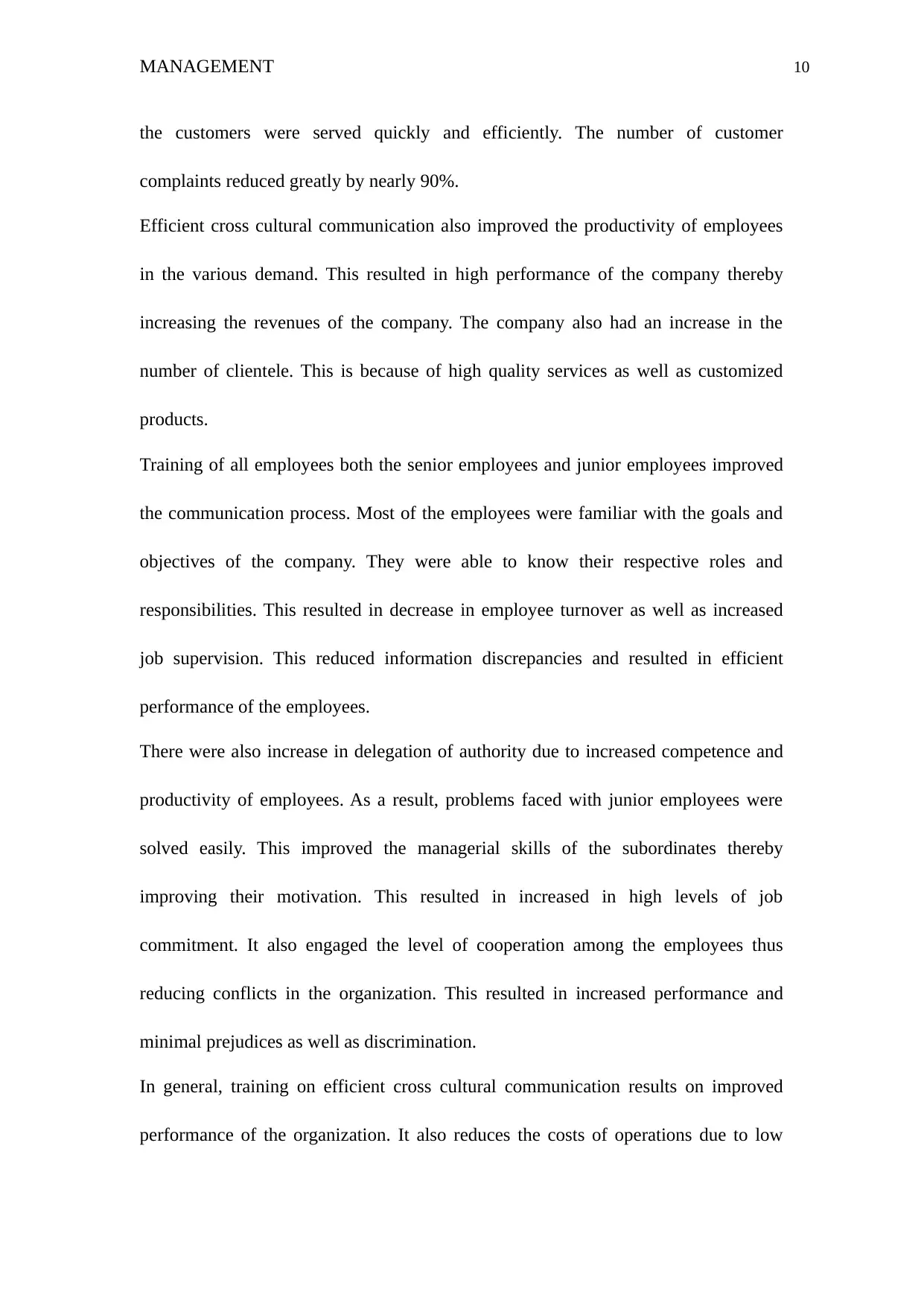
MANAGEMENT 10
the customers were served quickly and efficiently. The number of customer
complaints reduced greatly by nearly 90%.
Efficient cross cultural communication also improved the productivity of employees
in the various demand. This resulted in high performance of the company thereby
increasing the revenues of the company. The company also had an increase in the
number of clientele. This is because of high quality services as well as customized
products.
Training of all employees both the senior employees and junior employees improved
the communication process. Most of the employees were familiar with the goals and
objectives of the company. They were able to know their respective roles and
responsibilities. This resulted in decrease in employee turnover as well as increased
job supervision. This reduced information discrepancies and resulted in efficient
performance of the employees.
There were also increase in delegation of authority due to increased competence and
productivity of employees. As a result, problems faced with junior employees were
solved easily. This improved the managerial skills of the subordinates thereby
improving their motivation. This resulted in increased in high levels of job
commitment. It also engaged the level of cooperation among the employees thus
reducing conflicts in the organization. This resulted in increased performance and
minimal prejudices as well as discrimination.
In general, training on efficient cross cultural communication results on improved
performance of the organization. It also reduces the costs of operations due to low
the customers were served quickly and efficiently. The number of customer
complaints reduced greatly by nearly 90%.
Efficient cross cultural communication also improved the productivity of employees
in the various demand. This resulted in high performance of the company thereby
increasing the revenues of the company. The company also had an increase in the
number of clientele. This is because of high quality services as well as customized
products.
Training of all employees both the senior employees and junior employees improved
the communication process. Most of the employees were familiar with the goals and
objectives of the company. They were able to know their respective roles and
responsibilities. This resulted in decrease in employee turnover as well as increased
job supervision. This reduced information discrepancies and resulted in efficient
performance of the employees.
There were also increase in delegation of authority due to increased competence and
productivity of employees. As a result, problems faced with junior employees were
solved easily. This improved the managerial skills of the subordinates thereby
improving their motivation. This resulted in increased in high levels of job
commitment. It also engaged the level of cooperation among the employees thus
reducing conflicts in the organization. This resulted in increased performance and
minimal prejudices as well as discrimination.
In general, training on efficient cross cultural communication results on improved
performance of the organization. It also reduces the costs of operations due to low
Paraphrase This Document
Need a fresh take? Get an instant paraphrase of this document with our AI Paraphraser
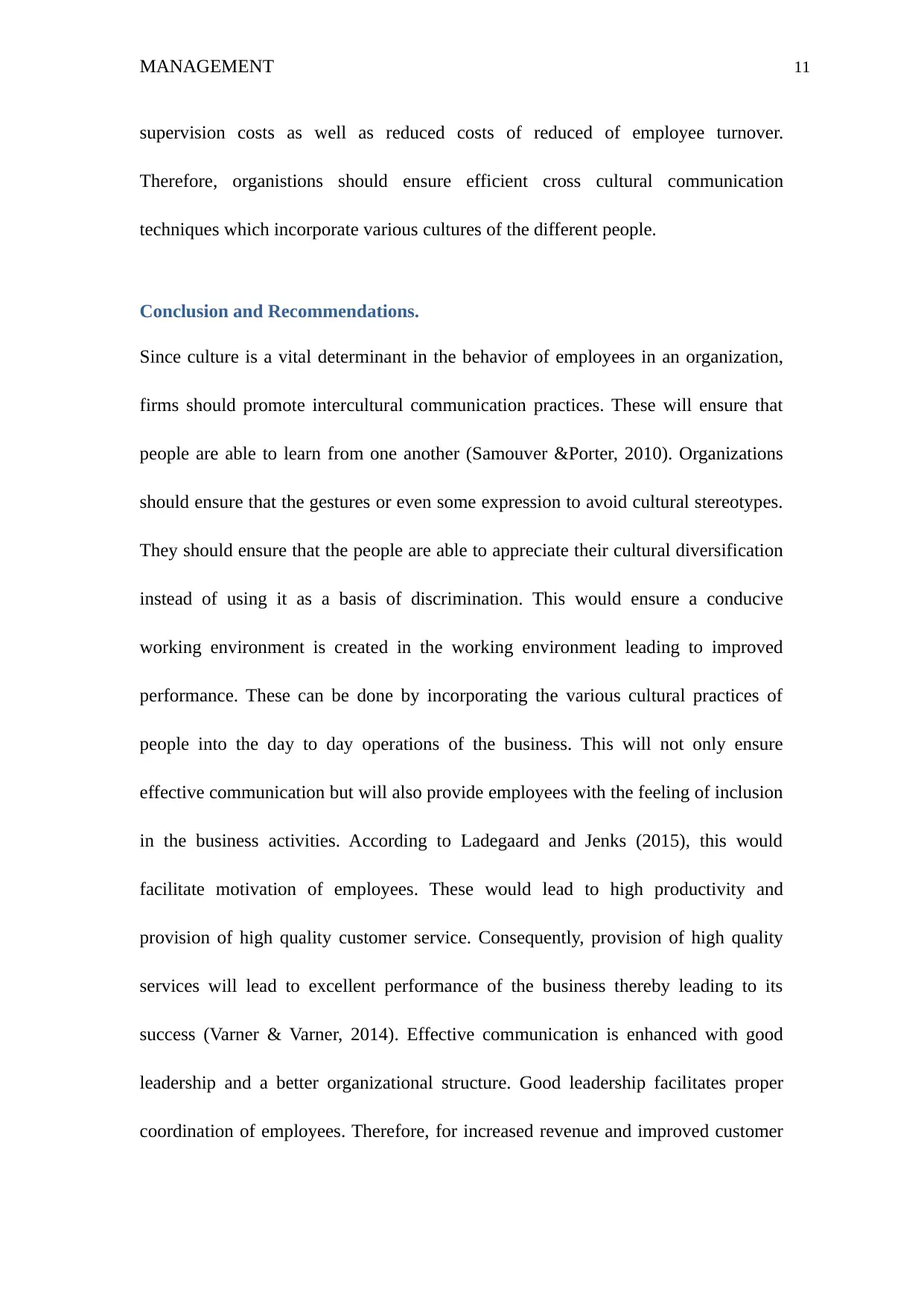
MANAGEMENT 11
supervision costs as well as reduced costs of reduced of employee turnover.
Therefore, organistions should ensure efficient cross cultural communication
techniques which incorporate various cultures of the different people.
Conclusion and Recommendations.
Since culture is a vital determinant in the behavior of employees in an organization,
firms should promote intercultural communication practices. These will ensure that
people are able to learn from one another (Samouver &Porter, 2010). Organizations
should ensure that the gestures or even some expression to avoid cultural stereotypes.
They should ensure that the people are able to appreciate their cultural diversification
instead of using it as a basis of discrimination. This would ensure a conducive
working environment is created in the working environment leading to improved
performance. These can be done by incorporating the various cultural practices of
people into the day to day operations of the business. This will not only ensure
effective communication but will also provide employees with the feeling of inclusion
in the business activities. According to Ladegaard and Jenks (2015), this would
facilitate motivation of employees. These would lead to high productivity and
provision of high quality customer service. Consequently, provision of high quality
services will lead to excellent performance of the business thereby leading to its
success (Varner & Varner, 2014). Effective communication is enhanced with good
leadership and a better organizational structure. Good leadership facilitates proper
coordination of employees. Therefore, for increased revenue and improved customer
supervision costs as well as reduced costs of reduced of employee turnover.
Therefore, organistions should ensure efficient cross cultural communication
techniques which incorporate various cultures of the different people.
Conclusion and Recommendations.
Since culture is a vital determinant in the behavior of employees in an organization,
firms should promote intercultural communication practices. These will ensure that
people are able to learn from one another (Samouver &Porter, 2010). Organizations
should ensure that the gestures or even some expression to avoid cultural stereotypes.
They should ensure that the people are able to appreciate their cultural diversification
instead of using it as a basis of discrimination. This would ensure a conducive
working environment is created in the working environment leading to improved
performance. These can be done by incorporating the various cultural practices of
people into the day to day operations of the business. This will not only ensure
effective communication but will also provide employees with the feeling of inclusion
in the business activities. According to Ladegaard and Jenks (2015), this would
facilitate motivation of employees. These would lead to high productivity and
provision of high quality customer service. Consequently, provision of high quality
services will lead to excellent performance of the business thereby leading to its
success (Varner & Varner, 2014). Effective communication is enhanced with good
leadership and a better organizational structure. Good leadership facilitates proper
coordination of employees. Therefore, for increased revenue and improved customer
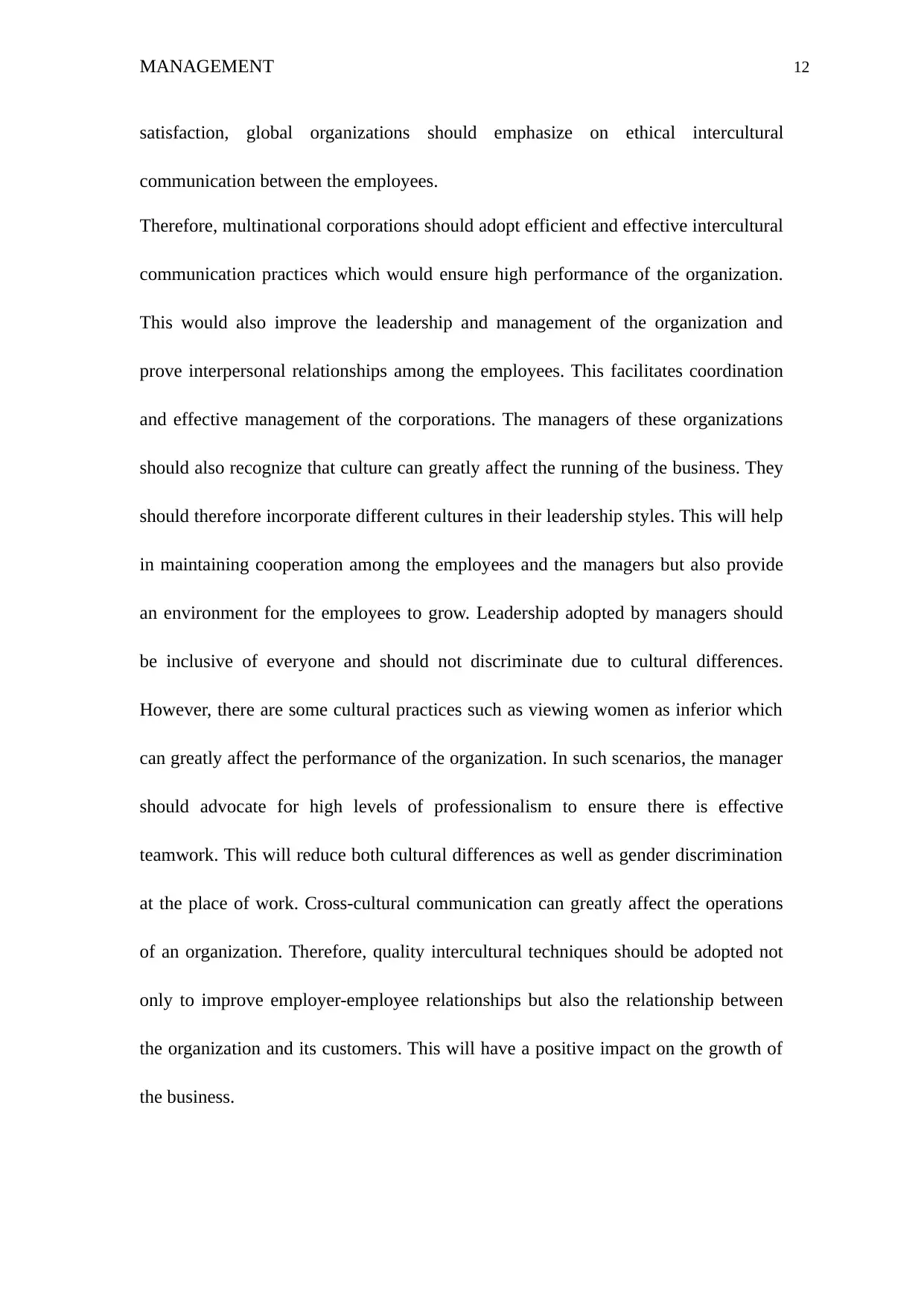
MANAGEMENT 12
satisfaction, global organizations should emphasize on ethical intercultural
communication between the employees.
Therefore, multinational corporations should adopt efficient and effective intercultural
communication practices which would ensure high performance of the organization.
This would also improve the leadership and management of the organization and
prove interpersonal relationships among the employees. This facilitates coordination
and effective management of the corporations. The managers of these organizations
should also recognize that culture can greatly affect the running of the business. They
should therefore incorporate different cultures in their leadership styles. This will help
in maintaining cooperation among the employees and the managers but also provide
an environment for the employees to grow. Leadership adopted by managers should
be inclusive of everyone and should not discriminate due to cultural differences.
However, there are some cultural practices such as viewing women as inferior which
can greatly affect the performance of the organization. In such scenarios, the manager
should advocate for high levels of professionalism to ensure there is effective
teamwork. This will reduce both cultural differences as well as gender discrimination
at the place of work. Cross-cultural communication can greatly affect the operations
of an organization. Therefore, quality intercultural techniques should be adopted not
only to improve employer-employee relationships but also the relationship between
the organization and its customers. This will have a positive impact on the growth of
the business.
satisfaction, global organizations should emphasize on ethical intercultural
communication between the employees.
Therefore, multinational corporations should adopt efficient and effective intercultural
communication practices which would ensure high performance of the organization.
This would also improve the leadership and management of the organization and
prove interpersonal relationships among the employees. This facilitates coordination
and effective management of the corporations. The managers of these organizations
should also recognize that culture can greatly affect the running of the business. They
should therefore incorporate different cultures in their leadership styles. This will help
in maintaining cooperation among the employees and the managers but also provide
an environment for the employees to grow. Leadership adopted by managers should
be inclusive of everyone and should not discriminate due to cultural differences.
However, there are some cultural practices such as viewing women as inferior which
can greatly affect the performance of the organization. In such scenarios, the manager
should advocate for high levels of professionalism to ensure there is effective
teamwork. This will reduce both cultural differences as well as gender discrimination
at the place of work. Cross-cultural communication can greatly affect the operations
of an organization. Therefore, quality intercultural techniques should be adopted not
only to improve employer-employee relationships but also the relationship between
the organization and its customers. This will have a positive impact on the growth of
the business.
⊘ This is a preview!⊘
Do you want full access?
Subscribe today to unlock all pages.

Trusted by 1+ million students worldwide
1 out of 14
Related Documents
Your All-in-One AI-Powered Toolkit for Academic Success.
+13062052269
info@desklib.com
Available 24*7 on WhatsApp / Email
![[object Object]](/_next/static/media/star-bottom.7253800d.svg)
Unlock your academic potential
Copyright © 2020–2026 A2Z Services. All Rights Reserved. Developed and managed by ZUCOL.



